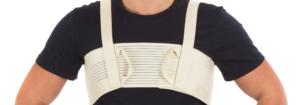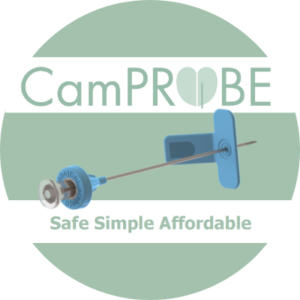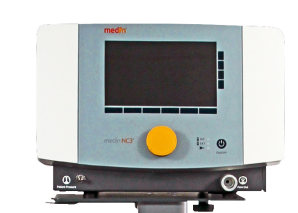- Home
- Products
- Bedding Protection
- Blood Pressure Monitoring
- Diagnostic Instruments
- ECG Products
- Footwear
- General Medical Consumables
- Protective Pants
- Labels
- Medin nCPAP Systems & Accessories
- Proctological Products
- Protective Clothing
- Pulse Oximetry
- Respiratory Care
- Electrosurgical Instruments
- Thermometry
- Ultrasound Products
- Xprecia PT/INR Testing
- Brands
- About
- How to Order
- News
- Contact
-
No items in wish list.
- Home >
- TRITEMP™ Non-Contact Thermometer for Healthcare professionals
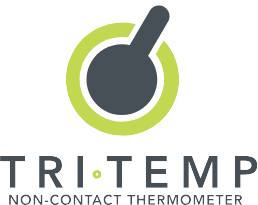

TRITEMP™ is a new non contact infrared thermometer for clinical use, giving easy, fast and accurate body temperature reading. Designed in the UK, its ergonomically designed angled head ensures optimal orientation for sensor alignment, easy of use and user comfort. TRITEMP™ requires ZERO probe covers, offering up to x 5 cost savings when compared with other types of thermometers used in hospitals today.
- ZERO consumables
- ZERO contact with the patient for optimal infection control
- Never touch the patient so readings can be taken when patient is resting
- Accuracy 0.2°C (0.4°F)
- Temperature reading in 1 second; rapid results saves staff time
- Ease of use – simple user lead interface
- Backlit screen with Green, Amber and Red indicator

INFECTION CONTROL
ZERO Contact
Plastic consumables are used with existing hospital thermometers to prevent infections as these thermometers touch the patient. A 900-bed hospital takes around 2-3 million temperature readings per year, 2-3 million plastic caps for disposal and 2-3 million unnecessary contact points with patients.

COST SAVING
ZERO Consumables
International hospital market is dominated by ear, axilliary, rectal and oral thermometers using plastic consumables (huge cost), touch the patient (poor patient experience & infection risk) and are not connected to the EMR (reduced user efficiency). Plastic consumables account for 97% of the hospital thermometer budgets in NHS. Revenue for existing suppliers is based on a consumable sales model (Kodak story), which has resulted in resistance to introduce non-contact, connected thermometers into hospitals.

TIME SAVING
Current thermometers used in hospitals require the care worker to ‘touch’ the patient which can represent huge discomfort and distress for certain patient groups such as Mental health, Autism, Dementia patients, and paediatrics, among others. As the thermometer never touches the patient it adopts optimal infection control within the hospital and protects both the patient and the care worker.
Telehealth is fast becoming an option for hospitals to care for patients in their own homes to reduce the cost burden and release beds within hospitals. The thermometer is easy to use, requires no technical skill and can transfer the results complete with patient details to the hospital at the touch of a button.
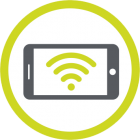
CONNECTIVITY
A recent government initiative in the UK has identified 17 Global Digital Exemplars (GDEs), that will provide care through the use of digital technology for a better patient experience.
Five Year Forward View and Personalised Health and Care 2020 describe the transformation needed across the health and care system to ensure it remains sustainable and of high quality.
The digital age has often been experienced not as a force for good but rather as an intrusive additional burden for care workers in a pressured existence and technology uptake has been a challenge.
Scan 4 Safety is another NHS initiative to introduce barcode readers for unique identification of Patient-Product-Place-Process for traceability and efficiency. This will enable traceability of patients and equipment, but this has not been transferred to routine thermometers.
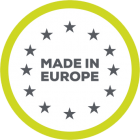
MADE IN EUROPE
TriMedika is an ISO13485:2016 accredited company and our devices are CE marked. We offer full maintenance and technical support on all devices including training and installation.
Our devices are designed by award winning product designs in the UK who lead the field in innovative design shaped to meet the user’s requirements in both form and function. Experts in product/market fit, our designers accommodate the evolving demands of the healthcare environment.
ENVIRONMENTALLY FRIENDLY
TRITEMP™ will enable hospitals to eliminate the use of plastic consumables in temperature measurement which could represents a reduction in over 150,000,000 plastic caps disposal to hospital waste every year. This benefits the hospital due to reduced plastic disposal costs, better infection control due to reduced volumes of contaminated waste and time efficiencies as it removes the need to stock plastics consumables, both for the in-hospital and remote/telehealth use.
Latest News
STERNSHIELD Launched in UK
2 Feb 2024
CamProbe launches in the UK
24 Feb 2023
Medin NC3 launched in UK
24 Feb 2023
Product Categories
- Bedding Protection
- Blood Pressure Monitoring
- Diagnostic Instruments
- ECG Products
- Footwear
- General Medical Consumables
- Protective Pants
- Labels
- Medin nCPAP Systems & Accessories
- Proctological Products
- Protective Clothing
- Pulse Oximetry
- Respiratory Care
- Electrosurgical Instruments
- Thermometry
- Ultrasound Products
- Xprecia PT/INR Testing
© 2024 Henleys Medical Supplies | Website Cookies & Privacy Policy | Company Privacy Notice | Terms of Sale | Returns | Company Reg No. 452882 | Vat No. GB229 2540 68 | Web design by Cariad Marketing

